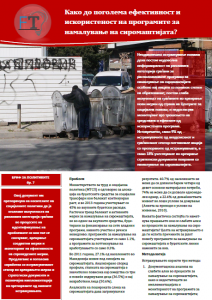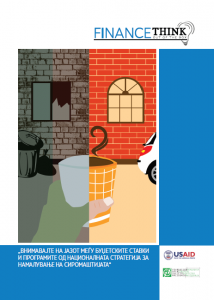The objective of the research is to investigate if remittances sent to Macedonia, Albania and Serbia serve social protection for household members left behind.
In particular, we will analyse if and how remittances determine/influence social condition (stability or vulnerability) of the household, the latter being described through an index composition of the income level, employment status, nourishment, health and housing conditions. For the purpose of the study, we aim at defining social stability/vulnerability not in traditional terms – only as “dollar a day” – but rather in terms of household’s ability to meet their basic needs aside income: nutrition, health services, housing, leisure and the like. This touches upon Green’s (2014) recent note that “being poor and sick is very different from being poor and healthy” and defines social stability in this multidimensional framework.
The key tasks include:
- developing a literature overview linking remittances to social protection and social vulnerability;
- devising an indicator of social vulnerability;
- econometric investigation of the causal links between remittances and social vulnerability;
- deeper qualitative investigation through interviews of the linkages between and contexts of the two phenomena (remittances and social vulnerability);
- devising policy proposals;
- wide communication with the policymakers and the public.
Donor: Regional Research Promotion Program
Duration: 2 years (2014-2016)
***
Project meeting, Rome 2-5 April 2015 – Agenda – Gallery
Media appearance – Ekonomski horizonti – RevolucionerMK
RRPP Annual conference presentation, Ohrid 28-29 May 2015 – Resources
Round table, 10 June 2015 – Invitation – Agenda – Gallery – Presentation
International Conference on Eurasian Economies, 9-11 September 2015, Kazan Russia – Presentation – Proceedings
Training & Project meeting, Amsterdam 16-20 March 2016 – Agenda – Gallery 1 2
Workshop “Migration and its Consequences for Albanian Households”, Elbasan, Albania, 8 September 2016 – Agenda
EBES International Conference, Vienna, Austria, 28-30 September 2016 – Picture
Economic forum, Skopje, 22 September 2016 – Agenda – Gallery
***
Policy briefs – Macedonia – Albania – Serbia
International book “Migration as social protection”
Journal article in International Migration


